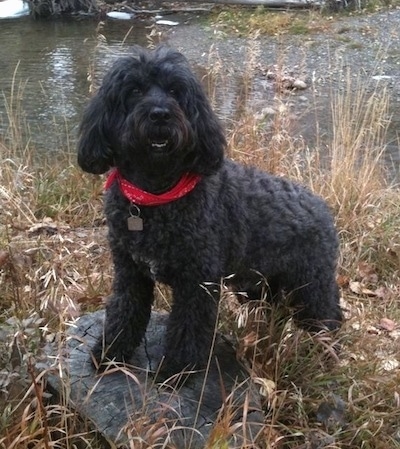
Parker the Portuguese Water Dog at 10 years old— "Parker loved to run and chase squirrels in our backyard. He was a devoted family friend and always wanted to be with us. He loved riding in the vehicle and if you didn't roll down the window he would find a way to roll it down himself. He was great company for my wife when she went running."
POR-chuh-geez WAH-tur dawg
The Portuguese Water Dog is a medium-sized, muscular dog. The topline is straight and level. The broad, domed head is slightly longer then the muzzle. The muzzle has a well-defined stop. The black nose is broad. The teeth meet in a scissors or level bite. The medium-sized, round eyes are dark. The heart-shaped ears are set high and hanging. The tail is not docked to aid in swimming, is thicker at the base and tapering. Dewclaws are sometimes removed. The legs are straight. The feet are webbed which aids the dog in swimming. The single-layered coat is thick and is either curly or wavy in texture. Coat colors come in black, white, various shades of brown, parti-colors of white with dark spots, black or brown with white markings, silver fox and gray.
The Portuguese Water Dog is a loyal, lively, water-loving dog. Animated, amusing, spirited and fun to be around, it often makes people laugh. This breed is affectionate with its family. They have great stamina, and with enough exercise will be calm. They are excellent with children and usually get along with other dogs and pets without any problems. They need to get to know cats so that the company of them will also cause no problems. They are even- and pleasant-tempered. Brave, keenly aware, highly intelligent and trainable; keen to work and quick to learn and understand instructions. Training these dogs is not difficult if you understand how to properly communicate with the canine animal. They are very sensitive to the tone of your voice and owners need to be calm, but show a consistent authority. Bear in mind that this extremely intelligent dog will take liberties if it feels it is stronger minded than its owners. Make sure you are consistent, firm and confident in the way you handle the dog. This breed may out-think its owner! Willing and eager to please, this is a faithful, obedient dog. They make good watchdogs. They have a very good sense of smell. Suitable for agility skill trials and numerous other dog sports. Portuguese Water Dog puppies are notorious chewers. Be sure to provide them with things they are allowed to chew on. Dominance levels vary even within the same litter. Barking and indoor activity levels vary greatly with the individual owners and their ability to balance out the dog's needs. Make sure you are this dog's firm, consistent, confident pack leader, providing daily mental and physical exercise. If you find your dog is barking at you in order to communicate, you need to hush the dog and look into your leadership skills. A dog that is barking at you in that manner is showing signs of dominancy issues. Do not allow dogs to jump on humans.
Height: Males 20 - 22 inches (50 - 57 cm) Females 17 - 20 inches (43 - 52 cm)
Weight: Males 42 - 55 pounds (19 - 25 kg) Females 35 - 49 pounds (16 - 22 kg)
Some lines are prone to hip dysplasia and PRA. Prone to GM-1 Storage Disease, a fatal nerve disease. Those dogs used for breeding should be tested. It appears when the puppy is about 6 months old.
The Portuguese Water Dog will be okay in an apartment if it is sufficiently exercised. It is moderately active indoors and a small yard will be sufficient. It can live outdoors in temperate climates, but would be much happier living close to its family and spending days in the yard.
The Portuguese Water Dog is an active, working type dog with great stamina. It needs daily physical and mental exercise, which includes a daily, long, brisk walk or jog to satisfy its migration instinct. While out on the walk the dog must be made to heel beside or behind the person holding the lead, as in a dog's mind the leader leads the way, and that leader needs to be the human. This breed does best with a job to do. They love to swim and there is nothing your dog would love more than if you threw a stick or ball in water for it to retrieve. It will also enjoy a vigorous romp. They make excellent jogging companions. They are high-energy dogs that need high-energy owners who can provide them with plenty of not only physical, but mental stimulation, along with strong leadership from every family member. Those dogs that are provided with this type of structure make excellent pets and working dogs and those that are lacking will tend to become problem dogs.
About 10-14 years.
About 4 to 8 puppies
The Portuguese Water dog should be brushed and combed regularly. Primarily coat type does not determine which trim they are put in. It is a personal preference. Two coat clips are used: One clip with the face and rear shaved, and the working retriever or pet clip where the dog is scissored so the coat appears to be about an inch long all over. This breed is virtually hypo-allergenic and good for allergy sufferers. The coat sheds little to no hair. The coat grows more slowly than that of a poodle and does not require as frequent scissoring or clipping.
The Portuguese Water Dog, as the name suggests, is native to Portugal. In its native land it is called the Cão de Água, which means "dog of water." It was developed from working dogs in the Iberian Peninsula. Excellent swimmers, the dogs worked alongside Portuguese fisherman for hundreds of years doing numerous jobs. They were so valuable they were considered part of the crew. The lion trim had a specific purpose. The fishermen would shave the rear and muzzle to aid in swimming and working in the water. Long hair was left to help keep vital organs warmer and protect the dog from injury on the main body, neck and head. The dogs worked herding and catching fish, retrieving broken nets or anything that fell into the water, carrying messages from one ship to the other or from ship to shore and even guarded the boats in foreign ports. The dogs were so popular even non-commercial fishermen could rent one for their fishing trips. As time went on technology replaced the dogs’ jobs and by the 1930s the breeds’ numbers dropped considerably. It was not until a wealthy Portuguese man named Vasco Bensaude started a breeding program in an attempt to save the breed did their numbers rise once again. The first pair of Portuguese Water Dogs was imported to the USA in 1958. In 1972 the Portuguese Water Dog Club of America was formed. In 1983 the breed was first recognized by the AKC. Some of the Portuguese Water Dog's talents are obedience, water trials, agility, therapy dog and assistance dog.
Gun Dog, AKC Working
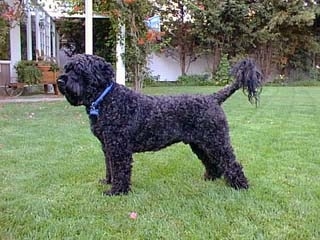
This handsome dog is named Boomer. Photo courtesy of Boomer and Rocky, two Portuguese Water Dogs
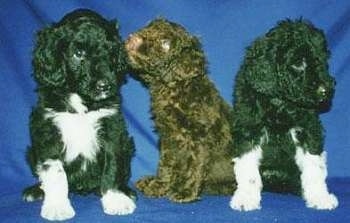
Portuguese Water Dog puppies! Photo courtesy of Jose Fontes Cristalmar / Cão de Água Português, Rio de Janeiro / Brazil
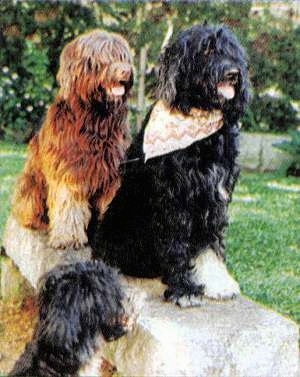
Photo courtesy of Jose Fontes Cristalmar / Cão de Água Português - Rio de Janeiro / Brazil
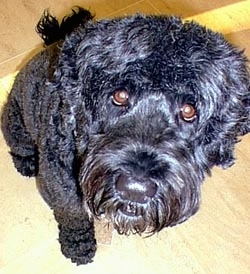
Boomer wants a hug!
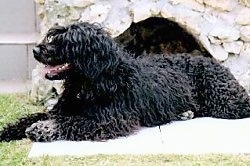
This is Amalie of Dream Wheel Kennels, but she is called Diddl after the German comic mouse.
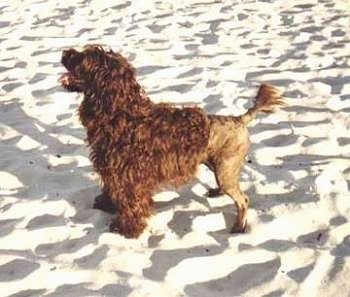
Photo courtesy of Jose Fontes, Cristalmar / Cão de Água Português, Rio de Janeiro / Brazil
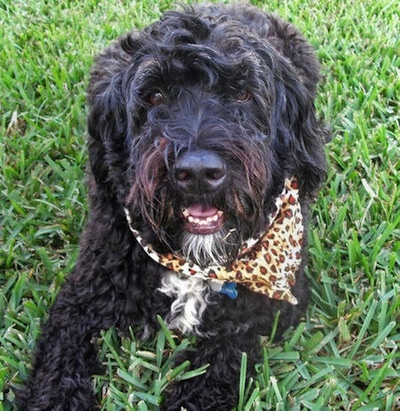
"Zoie is a happy-go-lucky Portuguese Water Dog girl. She is an older dog, currently 10 years old, but she sure doesn't act like it! She loves running on the beach, and her favorite activity is to run alongside my bike. She also loves to swim. Zoie is a very smart dog, knowing over 20 tricks and commands. She has been by my side for 10 years, and I couldn't ask for a better dog."